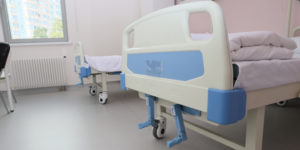Growing your own DON
I have long believed that you can teach someone almost anything but you cannot teach them to care. That has proven to be especially true during our search to find a director of nursing for our skilled nursing facility who could gain the respect of the nursing staff while maintaining compassionate care for residents. That journey led us to explore a non-traditional approach that is now paying dividends.
Lutheran Home, a five-star, 187-bed skilled nursing facility in Wauwatosa, Wisconsin, has seen its share of excellent nurses since it started serving the community more than 105 years ago. But the severe shortage of nurses over the last few years has made it a challenge to hire a director of nursing (DON) who was a perfect fit for the organization.
Initially, we took the common approach of considering candidates with a lot of experience who had followed the traditional route to this position, a 10- to 20-year process that generally includes promotions from RN to supervisor, manager, assistant DON and finally to DON. However, having experience alone does not ensure a good cultural fit.
We found that many seasoned candidates carried significant road blocks with them, including being resistant to change or being entrenched in their previous culture. Many of them also wanted to limit their roles to delegative management in the office rather than be a visible leader of a team.
What qualities matter?
After experiencing these issues and evaluating why these candidates were not successful at Lutheran Home, our senior leadership team took a step back to determine what qualities were most important in a new director of nursing.
These qualities were on our short list:
- Being a good culture fit. We wanted someone whose values, outlook and behavior were a match with our work environment.
- Having the respect of the team. Research has shown that regardless of their generation, nursing staff want respect and recognition for what they know and for their contributions to the team. They also want autonomy in their work and to have a sense of purpose. We wanted someone who valued each team member’s individual and organizational knowledge and wasn’t afraid to seek advice from them.
- Being a good listener and an eager learner. We needed someone who was willing to listen to suggestions, issues and ideas from the team and then evaluate them and make necessary changes based on their feedback. We also wanted someone who was open to learning, since no one person has all the answers.
- Being compassionate and caring. Ultimately we were looking for someone personally dedicated to the nursing team and determined to view patients as people, not as a “medical situation” or a “procedure.”
- Maintaining visibility on a regular basis. A successful DON needs to be accessible to the nursing staff and be willing to leave the office and spend time with them on the floor to understand some of their day-to-day challenges and achievements.
- Having transparency and integrity. Inspiring trust and respect in others is a sign of integrity and credibility for a DON, especially when team members believe in your judgment and decision-making skills. Transparency also is key to staff engagement—a better informed workforce results in stronger performance, longer tenure and increased efficiency.
Interestingly, experience was not a trait that made our list of “must-haves” when selecting a new DON. So, we decided to take a non-traditional approach by growing our own director of nursing from within the organization.
Our candidate, Angeline Cain, 30, had the unique situation of having grown up working at the Lutheran Home & Harwood Place. She began with us as a teen volunteer and her work evolved into a paid position as a kitchen server. Soon she discovered an interest and aptitude for nursing which led to a scholarship from Lutheran Home to get her nursing assistant certification followed by a LPN and most recently RN degree in nursing. Other than for a short period of time, Angie has continued to build her career with us as a pool nurse, staffing nurse and house supervisor until 2016.
In Angie, we could see the makings of a wonderful long-term DON. She really fits with the mission and values of our organization. She’s diplomatic, straight-forward and has the respect and support of the whole nursing staff. We knew she was a fast learner and could pick up some of the other skills of the job, including navigating sensitive staff and patient issues. With that in mind we set up a special three-month training program that enabled Angie to spend time in each managerial role and learn every aspect of the DON responsibilities from rehab to the Minimum Data Set.
Since taking over as Lutheran Home’s director of nursing earlier this year, Angie has managed the role effectively and strengthened her relationships with the nursing team. The leadership team is so pleased with how things are progressing and feels that the decision to “grow from within” was the right one.
For organizations that might want to consider a similar hiring strategy, here are some key steps to consider:
- Identify internal candidate(s) who possess the critical components identified. In our situation, we considered several individuals but only ended up approaching one of them.
- Include the nurse leadership team in the interview process. This is critical for team buy-in.
- Be sensitive to other internal candidates with interest (and more experience) in the position.
- Develop a 3- to 6-month internship to spend time in each managerial role and learn every aspect of the DON responsibilities. We did a three-month internship which was ample time to get Angie up and running in her new role.
- Establish authority immediately to ensure the new DON’s involvement in decisions affecting the department.
Kathy Cavers is administrator and COO of the Lutheran Home, a skilled nursing center located in Wauwatosa, Wisconsin that provides rehabilitation services, skilled nursing, specialized memory care assisted living, adult day services and child care.
I Advance Senior Care is the industry-leading source for practical, in-depth, business-building, and resident care information for owners, executives, administrators, and directors of nursing at assisted living communities, skilled nursing facilities, post-acute facilities, and continuing care retirement communities. The I Advance Senior Care editorial team and industry experts provide market analysis, strategic direction, policy commentary, clinical best-practices, business management, and technology breakthroughs.
I Advance Senior Care is part of the Institute for the Advancement of Senior Care and published by Plain-English Health Care.
Related Articles
Topics: Articles , Clinical , Staffing , Training











